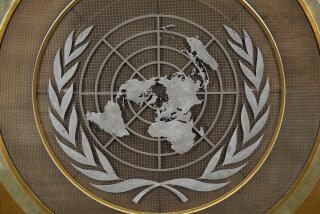Reform and the U.N.
- Share via
PAUL A. VOLCKER’S 18-MONTH investigation of the United Nations’ oil-for-food scandal ended last week with his identification of more than 2,000 firms and individuals that paid off Saddam Hussein’s government for lucrative contracts. The program improved the lives of ordinary Iraqis, especially the young and the elderly, but the slipshod way it was run has blackened the U.N.’s reputation.
There’s one way the world body can climb out of the hole, but it will require help from Russia, which had more companies involved in the oil-for-food program than any other nation.
U.S. Ambassador John Bolton, he of the fiery diatribes and neocon ideology, was restrained, diplomatic and eminently sensible in saying Volcker’s five reports demonstrated that the U.N. needs to reform its management quickly and improve its monitoring of future sanctions programs. Bolton also rightly said that companies and individuals that paid kickbacks or illegal surcharges to Hussein’s regime -- $1.8 billion in all -- should be prosecuted in their home countries.
An earlier report correctly blamed Secretary-General Kofi Annan, the Security Council and member states for the corruption and poor administration of the program. It did not call for Annan to resign. The U.N. imposed sanctions on Iraq after its invasion of Kuwait, but in 1996 began letting it sell oil and use the money to import humanitarian goods.
More recently, the United Nations has gotten a chance to improve its reputation. Two weeks ago, Detlev Mehlis, the chief U.N. investigator of the February assassination of former Lebanese Prime Minister Rafik Hariri, reported evidence that Syrian and pro-Syrian Lebanese intelligence officials planned the truck bombing that killed Hariri.
Mehlis’ preliminary report is an example of the good work the U.N. does. But to be a counterweight to the oil-for-food scandal, it needs Security Council follow-up. The 15 nations on the council need to pressure Syria to cooperate with the continuing investigation. If Damascus refuses, the council should impose sanctions, including freezing suspects’ foreign bank accounts and barring their travel outside Syria -- as the U.S., France and Britain proposed last week.
Russia could veto the proposal. Moscow has said the question of sanctions should be delayed until Mehlis’ scheduled December report. But that’s not good enough; Syria must be pressured to comply now. A nation’s top officials cannot be allowed to get away with assassinations.
Hussein favored Russia with nearly a third of the oil contracts given out between March 2001 and December 2002, Volcker reported. In return, Moscow paid more than $52 million in illegal surcharges. Russia should use Syria as an opportunity to act like a responsible permanent member of the Security Council, rather than an agent of instability in the Middle East.
More to Read
Sign up for Essential California
The most important California stories and recommendations in your inbox every morning.
You may occasionally receive promotional content from the Los Angeles Times.










